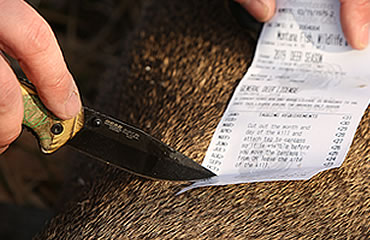Study indicates whitetails forgot to social-distance.
I just finished reading an article that said 33% of the whitetails in a four-state USDA study tested positive for COVID-19 antibodies. Of the four states (Illinois, Michigan, New York and Pennsylvania), Michigan was highest, with 67% of the deer tested being positive for COVID-19 exposure.
The article goes on to say the result is not a surprise since whitetails and humans come in close contact. I’m not sure what that means, since almost every whitetail I’ve ever seen took social distancing to extreme measures, but regardless of how they got the disease, it is present in a significant percentage of the deer population.
Before I go any further, please note I am not suggesting there’s any reason not to hunt deer this fall. There are still far too many unknowns about the disease for anyone to say one activity is safe and another isn’t. I’ll be out there come October, business as usual.
That said, between CWD concerns and now COVID-19, it’s a good idea to give a little more thought to how you field-dress your deer. It wouldn’t hurt to err on the side of caution and take a few more precautions.
For starters, double up on field-dressing gloves. My kit contains a thick pair of kitchen-scrubbing gloves, and an additional shoulder-length pair of thin field-dressing gloves. I’m also going to wear clear shooting glasses while field-dressing this year. Put on the long field-dressing gloves first, and then don the kitchen gloves. It doesn’t really matter which you wear on the outside, but the kitchen gloves fit tighter and, when worn on the outside, eliminate the sloppy fit of field-dressing gloves.
Next, put your knife and any other tools you’ve used in a plastic bag. When you’re all done touching anything that could spread disease or infection, remove your gloves by pulling from the farthest point from your hands, letting the gloves go inside-out as you pull. Place the dirty gloves in a garbage bag.
When you get home, clean your tools with warm, soapy water. I’ve seen several instances where people recommend soaking your knife in a bleach solution. That’s a good idea, but bleach solution alone is not considered effective at eliminating the prions associated with CWD. In fact, the CDC’s recommended regimen for decontaminating surgical tools that come in contact with prions would ruin virtually every hunting knife (at least the non-metal parts). A bleach solution should be quite effective on COVID-19 viruses, however. If you use bleach, be sure to rinse your tools thoroughly afterward.
How worried should you be about CWD? I prefer to use the term “aware” instead of “worried.” If you hunt in an area that is known to have CWD-positive deer, have your meat tested before you eat it. Also take the above precautions for field-dressing and also for butchering. There have been no known cases of a hunter getting CWD (or what would be the human variant of it), but why take a chance?
Regarding COVID-19 and deer, the USDA said this: “There is no evidence that people can get COVID-19 by preparing or eating meat from an animal infected with SARS-CoV-2, including wild game meat hunted in the United States.”
Nevertheless, they recommend the following:
• Do not allow contact between wildlife and domestic animals, including pets and hunting dogs.
• Do not harvest animals that appear sick or are found dead.
• Keep game meat clean and cool the meat down as soon as possible after harvesting the animal.
• Avoid cutting through the backbone and spinal tissues and do not eat the brains of wildlife.
• When handling and cleaning game, wear rubber or disposable gloves. Do not eat, drink, or smoke.
Finally, don’t let fears about disease stop you from enjoying deer season. Man has been harvesting and eating whitetails for far too long for it to suddenly be unsafe. A little knowledge and precaution is a good thing when taken in moderation.
If you’d like to read the entire USDA article about COVID-19 and whitetails, you can find it here.
Read Recent Tip of the Week:• Foaming at the Mouth: Don't get mad. Instead, take precautions to protect your broadheads.




.png)